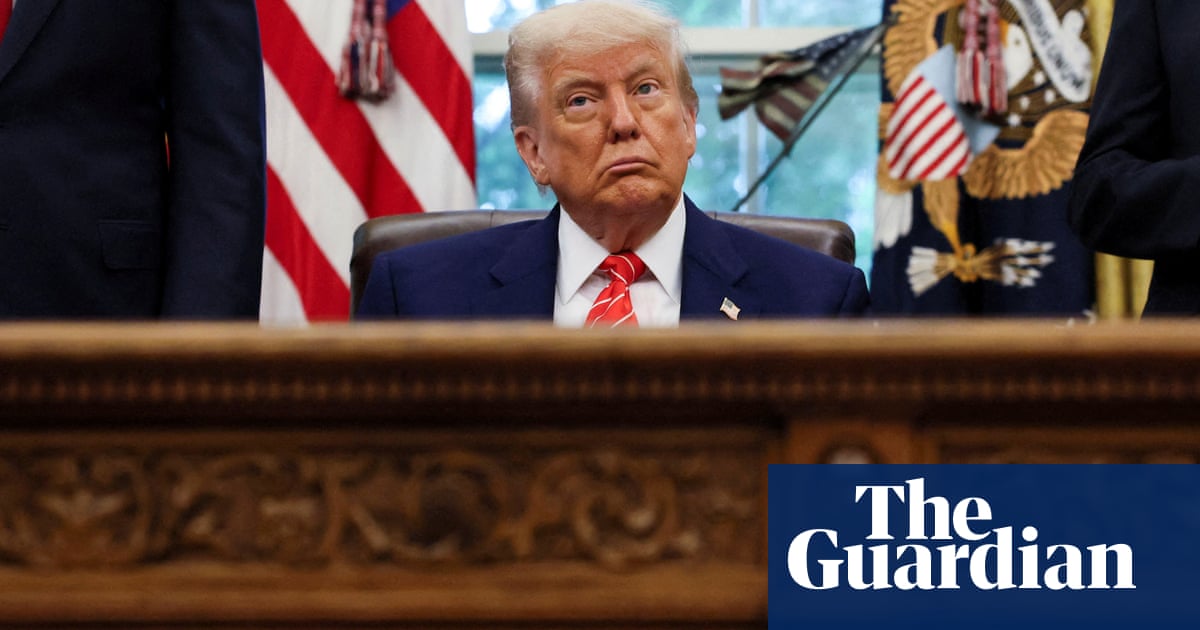Americans are reconsidering major life events including marriage, having children and buying a home amid economic anxiety in the opening months of the Trump presidency, according to an exclusive poll for the Guardian.
Six in 10 Americans said the economy has affected at least one of their major life goals, according to the Harris poll, citing either lack of affordability or anxiety around the current economy.
Though Donald Trump’s tariff policies have only been in place for a few weeks, and though the president has temporarily walked back on some of his harshest policies, the findings are a sign that Trump’s economic agenda could have long-term effects.
The Trump administration has said it wants to encourage Americans to have more babies, and is floating a $5,000 “baby bonus” for new mothers. But its economic policies appear to be a major stumbling block to that ambition. Of those who originally planned to have a child in 2025, a majority say the current economy has affected their plans in some way, by either being unable to afford having a child (32%) or being uncomfortable having one in the current economy (33%).
Large percentages of those surveyed said they wanted to make major financial decision: 45% said they wanted to make a big purchase – a car, for example, or appliances – and 42% said they wanted to buy a house.
But 75% of those who said they wanted to buy a home said the current economy has derailed them.
Buying a home has long been seen as the benchmark for the American dream, but has become increasingly unaffordable for many Americans.
Home pricesrocketedafter a buying frenzy during the pandemic, when interest rates were at zero, and have not come down since. Thoughmortgage rateshave fallen slightly since their recent peak of about 7.5%, the average 30-year mortgage rate in March was 6.7% – more than double what it was four years ago.
The economic anxiety disproportionately affects the long-term goals of younger Americans, who are less likely to own a home already, be married or have kids. A majority of Gen Z and millennials renters (68%), for example, said they had a goal of buying a house, compared to just 29% of renters who are older.
Much of the instability appears to come from the rising cost of living: 65% of Americans said they thought the cost of living has worsened since the start of the year, and half said it had made it more difficult to afford their living expenses.
A vast majority (78%) said they had noticed increased grocery prices over the last few months, while 60% said they had also noticed monthly bills and everyday essentials getting more expensive.
Although nearly half (48%) of Republicans said the cost of living has gone up this year, Republicans appear to be more optimistic about the overall state of the economy, particularly compared to when Joe Biden was in the White House.
When respondents were asked last May whether they thought the US was experiencing a recession, 67% of Republicans said they believed the country was in a recession. Nearly a year later, the number has dropped to 40% of Republicans.
On the other hand, 49% of Democrats believed the country was in a recession last May, compared to 59% who think the US in in a recession now. The US is not in recession and has not been since February to April 2020, during the Covid pandemic.
Perhaps most concerning for Trump is that although only 33% of Republicans believe theUS economyis worsening, 64% of independents believe it is getting worse, more in line with Democrats (73%). More independents believed that the economy was in a recession last May (53%) compared to this April (46%), though the switch in opinion is much smaller than for Republicans.
Though Trump has said that his tariffs will “make America wealthy again”, it appears few Americans believe him.
Tariffs came out on top in a list of things that Americans believe will most likely hurt their household financially in 2025. Nearly a third (29%) of respondents, including 39% of Democrats, 28% of independents and 21% of Republicans, said that tariffs will do the most harm. Over 20% said that government policies will be the most harmful, including 24% of independents.
This survey was conducted online within the US by the Harris Poll from 24 to 26 April, 2025, among a nationally representative sample of 2,102 US adults.
